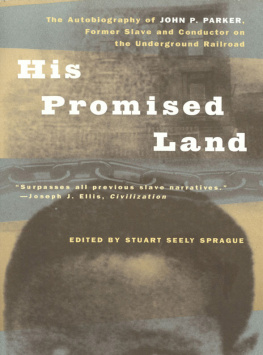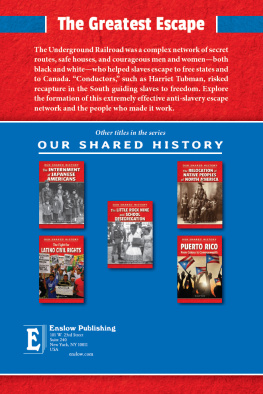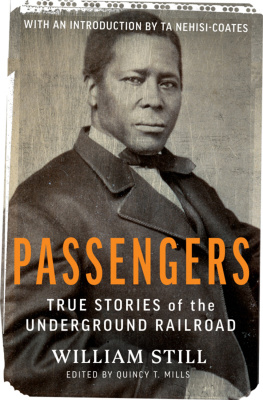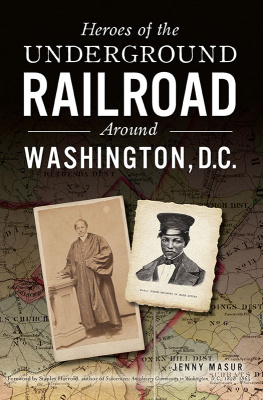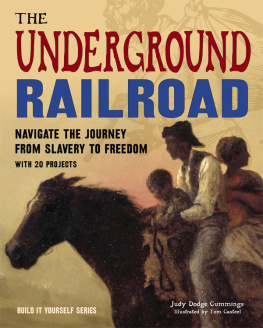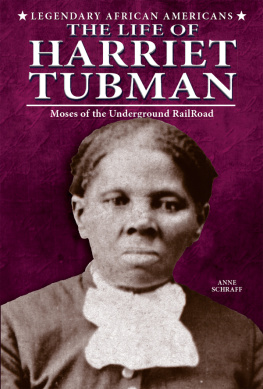HIS
PROMISED
LAND

THE AUTOBIOGRAPHY OF
JOHN P. PARKER,
FORMER SLAVE AND CONDUCTOR
ON THE UNDERGROUND RAILROAD
Copyright 1996 by The John P. Parker Historical Society
All rights reserved
First published as a Norton paperback 1998
Excerpt from Frank Moody Gregg Papers, MSS 265 is by permission of the Ohio Historical Society.
For information about permission to reproduce selections from this book, write to Permissions, W. W. Norton & Company, Inc., 500 Fifth Avenue, New York, NY 10110.
The text of this book is composed in Garamond No 3 with the display set in Caslon Antique
Composition and manufacturing by The Maple-Vail Book Manufacturing Group.
Book design by Jam Design
Library of Congress Cataloging-in-Publication Data
Parker, John P., 18271900.
His promised land : the autobiography of John P. Parker, former slave and conductor on the underground railroad / edited by Stuart Sprague.
p. cm.
1. Parker, John P., 18271900. 2. SlavesSouthern StatesBiography. 3. FreedmenBiography. 4. Afro-American abolitionistsBiography. 5. Underground railroad. I. Sprague, Stuart, 1937. II. Title.
E450.P238 1996
975.004960730092dc20
96-14570
CIP
ISBN 978-0-393-34801-9 (e-book)
W. W. Norton & Company, Inc.
500 Fifth Avenue, New York, N.Y. 10110
www.wwnorton.com
W. W. Norton & Company Ltd. Castle House, 75/76 Wells Street, London WIT 3QT
A BRIEF BIOGRAPHICAL SKETCH
J OHN P. P ARKER was born into slavery in Norfolk, Virginia, in 1827, the son of a black woman and a white man.
It took Parker eighteen years to acquire his own freedom. He was owned for many years by a Mobile doctor.reputation for stubborness was perhaps why the price of his freedom was set unusually high. He paid the widow back over the course of a year and a half, using his skills in the foundry to earn money. In 1845, Parker became a free man.
Moving first to New Albany, Indiana, and then to Cincinnati, Ohio, Parker began boarding with a barber who hoped to rescue his own family from slavery. Parker was initially reluctant to join the man in his endeavor, but eventually, although the barber himself gave up in despair, Parker managed to rescue the familythe first in a long string of successes. In 1848, Parker started his own family, marrying Miranda Boulden, a Cincinnati native, and establishing a small general store at Beechwood Factory, Ohio.
The next year, Parker and his wife moved to Ripley, Ohio, then a bustling river town with a thriving abolitionist community (the Ripley Abolition Society had a membership of over 300). In Ripley, Parker could work at his profession in ironworks and continue to help slaves escape. Many anti-slavery southerners, particularly a number of ministers, had chosen or been forced to leave the South and had relocated to this area along the Ohio River. Ripley was home to two Negro settlements, which had been created thirty years before Parkers arrival as places for the emancipated slaves of planter Samuel Gist. Ohios first abolitionist, U.S. Senator Alexander Campbell, also lived in Ripley, as did the Reverend John Rankin, whose hilltop home served as a beacon to escaping slaves. Rankins house allegedly sheltered the woman who inspired Harriet Beecher Stowes Eliza, whose harrowing night passage across the thawing Ohio River, leaping from one ice patch to the next with her baby in her arms, is vividly described in Uncle Toms Cabin.
To reach Ripley, fugitives often followed the Maysville road, which connected the slave-rich bluegrass region centered in Lexington, Kentucky with the Ohio River. Maysville, the These borderlands in Ohio sustained the busiest terminals on the entire Underground Railroad, possibly even providing the railroad with its name. According to W. M. Mitchells 1860 The Underground Railroad, the term originated in 1831 when Tice Davis swam across the Ohio, barely eluding his former master. Furious, the slaveowner is said to have exclaimed, The damned abolitionists must have a railroad by which they run off slaves.
For nearly fifteen years, John P. Parker rescued fugitive slaves, leading the Cincinnati Commercial Tribune to write, shortly after Parkers death, a more fearless creature never lived. He gloried in danger. He would go boldly over into the enemys camp and filch the fugitives to freedom. The inherent danger of aiding slaves was much greater for an African-American who, if caught, would receive a lengthy jail term, providing he survived pursuit without being shot dead. When the Civil War broke out, he smuggled a few hundred slaves into the service of the Union Army, a record admired in the 1883 History of Brown County, Ohio: It is but a word of justice to say of Mr. Parkers service during the late war, that the half could not be told.
Parker led a dual lifeby night ferrying fugitives across the Ohio River, by day working as an iron moulder. In his oral autobiography, Parker concentrates on stories of the Underground Railroad. His work in the foundry and machine shop was also notable as was the series of inventions he patented.
In December 1865, John P. Parker and his partner William Hood purchased a foundry and blacksmith shop including its contents for $6,000. By mid-March of 1868, Parkers business and property were estimated to be worth between $8,000 and $10,000. He sought out African-American buyers and appealed to racial pride. An article entitled Mechanic written from Ripley, Ohio, appeared in the Little Rock Arkansas Freeman of October 5, 1869. In it Parker declared that a plow made by a black man, tells for us more than a hundred first class speeches. Parker proposed sending an Agent among the Southern peoplethe said Agent to be a colored man. He will ask the trade of our people in particular. Of his products he declared, we manufacture engines, varying in sizes from ten to twenty-five horsepower; Dorseys patent reaper and mower; and a sugar mill, which thus far has given universal satisfaction. Besides we expect this fall and winter, to get up an assortment of steel plows.
Many African-American businesspeople failed during the Panic of 1873, because of undercapitalization, hard times, and prejudice, but Parker survived. He brought in a partner to manufacture threshers as Belchamber & Parker in 1876. The firm dissolved two years later. Parkers net worth peaked at between $15,000 and $20,000 during 1882, but diminished during the economic downturn in 1883.
Parkers work diversified. By now he had developed a black-smith shop and a machine shop, as well as a coal yard associated with his foundry. But becoming partners with a hard-working, practical miller as the firm of J. P. Parker & Kirkpatrick brought him grief. They shared an investment in the Model Mill, which was bought by Kirkpatrick in August 1883.
This range of activities stretched Parkers resources to the breaking point, and, by mid-June of 1885, he was in a difficult financial situation. His expertise in the foundry business was of no use to him in milling. Investment in milling brought Parker to the brink of bankruptcy, which was compounded by a May 1, 1886 fire that totally consumed the four
Three years later, in August of 1889, another fire that would affect Parker broke out. It started in the boiler room of the Ripley Mill & Lumber Company on Front Street near Parkers home and business. The towns steam fire engine was insufficient, and the fire spread to nearly the entire block. Parkers residence was completely destroyed and his old foundry damaged, but the fire department was able to save Parkers machine shopa stroke of good luck since his principal business at the time was manufacturing tobacco screws for his patented tobacco presses. Parker proved resilient; by September of 1890, he had built a new foundry and woodworking shop a block and a half from his old one. The Phoenix Foundry was the largest such enterprise located between Portsmouth and Cincinnati, Ohio. Parkers son, Hale, served as the western agent for the John P. Parker tobacco press and pulverizer.
Next page
